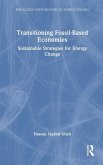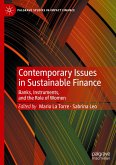One of the greatest challenges facing humanity is to achieve sustainable and inclusive growth. In addition to public and state financial resources, policymakers leverage private companies to promote sustainable growth through green investments and innovations, encouraging private initiatives and financial activities. In this context, SMEs play a crucial role not only at the European level but also as economic actors implementing and pursuing policy goals. This book focuses on the capital and financial aspects of SME activities for sustainable and inclusive growth, aiming to provide a comprehensive overview of the state of the art.
Starting from a business economics perspective, the book discusses financial instruments for both the short and long term. Supply Chain Finance (SCF) offers a theoretical framework for short-term instruments, improving overall supply chain sustainability through companies' choices of suppliers, buyers, customers, financial institutions, and technology providers. Innovations such as FinTechs and Blockchain can enhance the effectiveness of sustainable business and bring about substantial changes in relationships among different actors.
With regard to long-term instruments like debt capital, the book analyzes the traditional banking channel along with the role of the financial market. Factors such as the impact of FinTechs and other innovations on market efficiency have the potential to change financing activities, making relationships more complex and binding. In this complex system, new laws and regulations can mean sudden changes in terms of providing loans. The banking sector is increasingly using CSR drivers to assess creditworthiness and integrating green lending into credit policy, in keeping with central bank decisions and international board standards. These rules supplement existing ones on prudential supervision, capital buffers, and the broader international regulatory framework for banks.
Lastly, the book explores the potential impact of "greenwashing" on SMEs pursuing sustainable practices. To address this, it proposes an approach to measuring sustainability for Italian SMEs based on a survey of 2500 enterprises and provides Matlab tools for investigating green and other sustainable behaviors.
Starting from a business economics perspective, the book discusses financial instruments for both the short and long term. Supply Chain Finance (SCF) offers a theoretical framework for short-term instruments, improving overall supply chain sustainability through companies' choices of suppliers, buyers, customers, financial institutions, and technology providers. Innovations such as FinTechs and Blockchain can enhance the effectiveness of sustainable business and bring about substantial changes in relationships among different actors.
With regard to long-term instruments like debt capital, the book analyzes the traditional banking channel along with the role of the financial market. Factors such as the impact of FinTechs and other innovations on market efficiency have the potential to change financing activities, making relationships more complex and binding. In this complex system, new laws and regulations can mean sudden changes in terms of providing loans. The banking sector is increasingly using CSR drivers to assess creditworthiness and integrating green lending into credit policy, in keeping with central bank decisions and international board standards. These rules supplement existing ones on prudential supervision, capital buffers, and the broader international regulatory framework for banks.
Lastly, the book explores the potential impact of "greenwashing" on SMEs pursuing sustainable practices. To address this, it proposes an approach to measuring sustainability for Italian SMEs based on a survey of 2500 enterprises and provides Matlab tools for investigating green and other sustainable behaviors.








